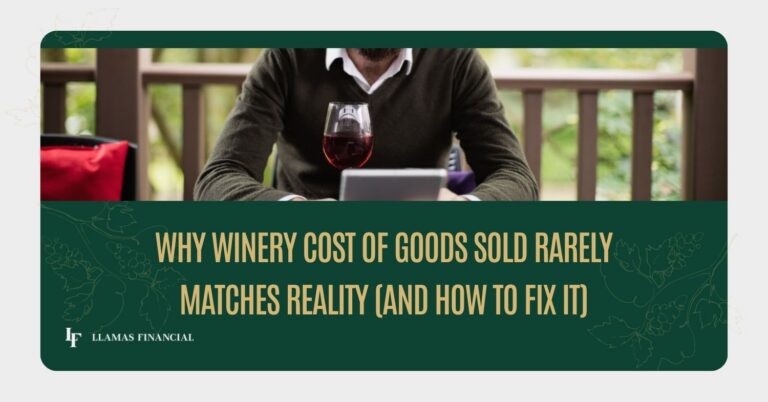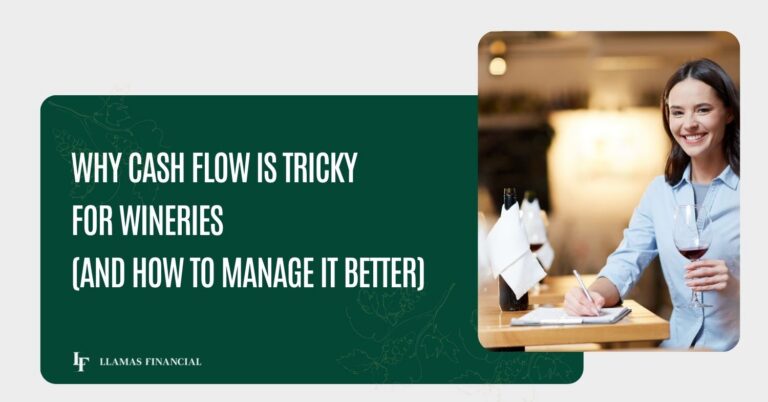Starting and running a winery is one of the most rewarding experiences you can take on, but it is also one of the most complex from a financial standpoint. Between vineyard costs, production expenses, regulatory filings, and multiple sales channels, there are countless places where things can go wrong.
The smallest error in recordkeeping or compliance can cost you thousands of dollars in penalties, lost deductions, or missed opportunities. That is why many wineries choose to work with a winery accountant from the very beginning.
A winery accountant does more than just keep the books. They understand the unique challenges of the wine industry and help you avoid mistakes that could derail your financial health.
Mistakes Wineries Commonly Make Without Specialized Support
1. Misclassifying Vineyard and Production Costs
One of the biggest mistakes we see is when wineries lump all expenses into a single category. Grapes, vineyard labor, barrels, bottling supplies, and tasting room payroll all get grouped under “supplies” or “cost of goods sold.” The problem is that you lose the ability to see your true cost per case, your vineyard profitability, or the impact of packaging decisions. This lack of clarity makes it almost impossible to price correctly or identify where money is being wasted.
2. Missing Compliance Deadlines
The Alcohol and Tobacco Tax and Trade Bureau (TTB) and state alcohol authorities require strict reporting. Federal excise tax filings, operational reports, and state shipping reports all have different due dates. If you miss one, you may face fines or even risk losing your license. Many new wineries are caught off guard because they do not realize how many separate reports are required.
3. Overlooking Tax Credits and Deductions
There are valuable tax credits for small wine producers that can reduce excise tax liability. Agricultural expenses often qualify for deductions that generalist accountants miss. Without a winery accountant, you may end up paying more in taxes than necessary simply because the deductions were not identified.
4. Ignoring Cash Flow Projections
It is common for winery owners to rely on their profit and loss statement alone, but profit is not the same as cash flow. You may look profitable on paper while still struggling to pay bills because money is tied up in inventory. Without forward-looking cash flow projections, it is easy to run into shortages that force you to take on expensive short-term debt.
5. Relying on Generic Accounting Systems
Many wineries start with software or setups designed for retail or restaurants. These systems are not built for multi-stage inventory, vineyard allocations, or compliance reporting. Trying to force winery data into a generic system often creates more problems than it solves.
How a Winery Accountant Prevents These Problems
A winery accountant builds your financial system around the realities of winemaking. Instead of trying to fit your unique business into a one-size-fits-all structure, they design charts of accounts, reporting systems, and cash flow models that reflect how your winery actually operates.
Here is how that saves you money:
- Accurate categorization means you know your true costs and can make smarter pricing decisions.
- Organized records ensure compliance reports are filed on time, avoiding penalties.
- Industry knowledge helps you capture every deduction and tax credit you are entitled to.
- Cash flow forecasts give you the visibility to prepare for shortages rather than scrambling when accounts are low.
A winery-focused setup saves you from expensive system overhauls and clean-up later.
Real-World Examples of Expensive Mistakes
- A winery that misclassified vineyard development costs missed out on thousands in deductions and had to pay a large unexpected tax bill.
- Another winery failed to file a required state shipping report and faced fines that could have been avoided with proper tracking.
- A third winery priced its bottles too low because it did not have a clear cost per case, only realizing later that every wholesale sale was producing a loss.
In each case, the mistake was preventable with the right financial structure and guidance in place.
The Value of Proactive Guidance
Perhaps the biggest difference a winery accountant makes is being proactive instead of reactive. A general accountant often looks backward, recording what has already happened. A winery accountant looks forward, helping you plan for what is coming. They identify potential cash crunches, compliance deadlines, or tax opportunities before they become urgent. That proactive support is what saves wineries the most money over time.
Takeaway
Running a winery comes with enough challenges without adding costly financial mistakes to the list. From compliance to cash flow, the risks are high, but so are the rewards of getting it right.
A winery accountant helps you avoid expensive missteps by setting up your financial system correctly, keeping you compliant, and giving you the clarity to make better decisions. Instead of worrying about what you might be missing, you can focus on growing your winery with confidence.
At Llamas Financial, we specialize in working with wineries at every stage, from the first vintage to full-scale operations. Our role is to make sure you do not leave money on the table or run into problems that could have been prevented. With the right financial guidance, your winery can grow stronger, avoid costly surprises, and stay focused on what matters most: making and selling great wine.




